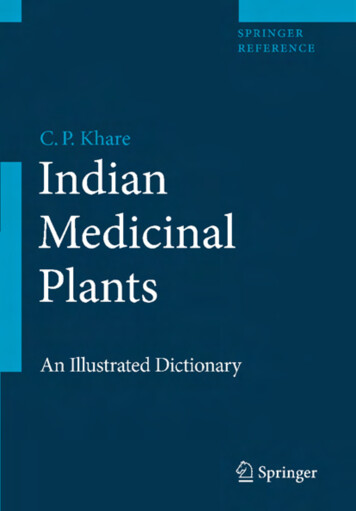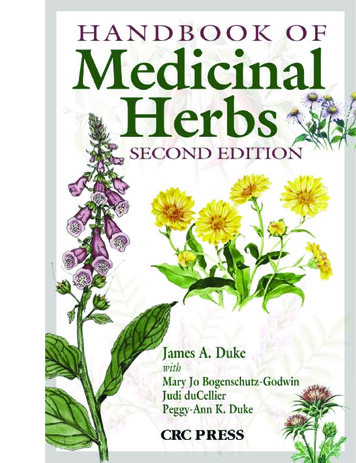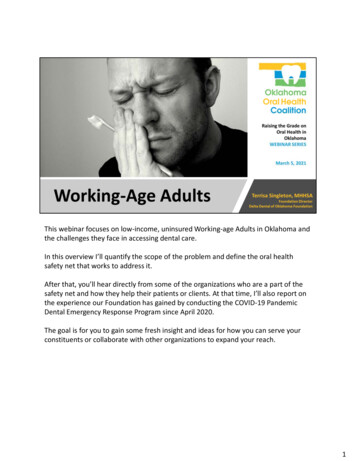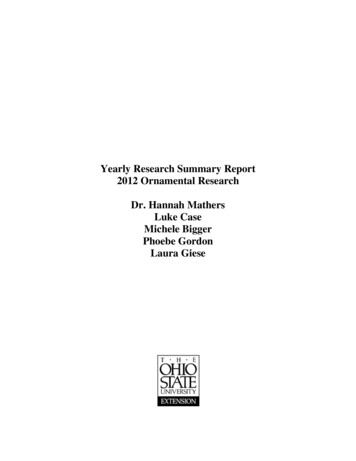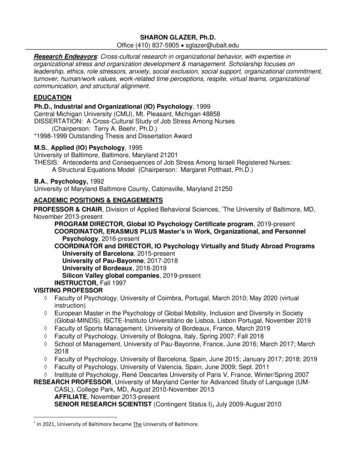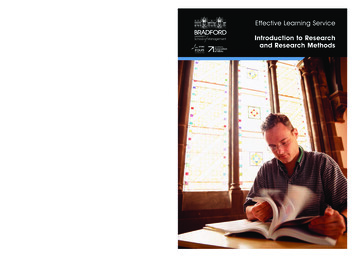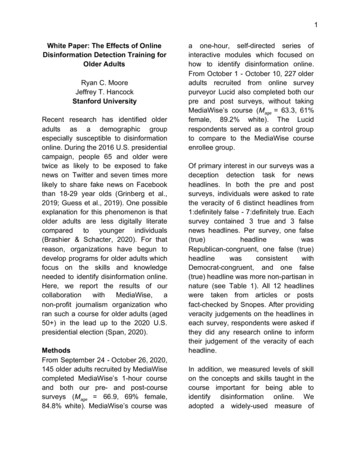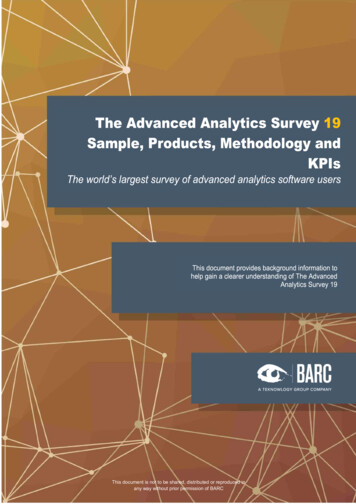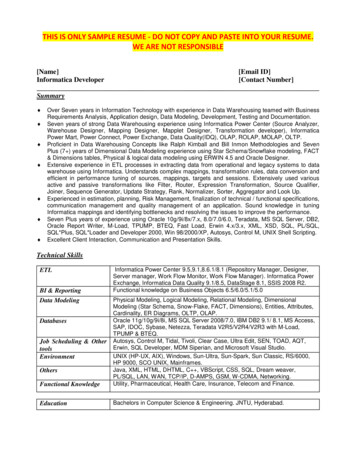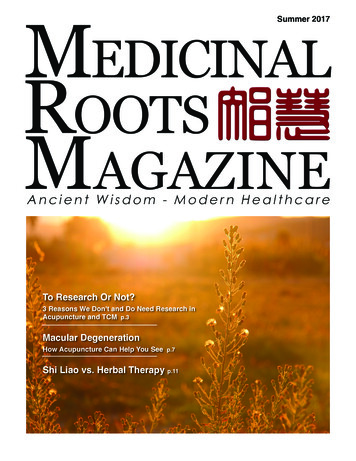
Transcription
Summer 2017To Research Or Not?3 Reasons We Don't and Do Need Research inAcupuncture and TCM p.3Macular DegenerationHow Acupuncture Can Help You See p.7Shi Liao vs. Herbal Therapy p.11
IN3this issueTo Research Or Not?3 Reasons We Don't and Do NeedResearch in Acupuncture and TCMSonia F. Tan BA, BA(H), DTCM Dip.,DAOM, R.Ac., R.TCM.P. (BC)EDITOR-IN-CHIEFKim GrahamDIRECTOR Kim GrahamPUBLISHER Kim GrahamCHINESE LANGUAGE Weijia TanSimon Au YoungCOPY EDITOR Kyla DreverShanie RechnerSOCIAL MEDIA Shanie RechnerMANAGERINTEGRATED7Macular DegenerationHow Acupuncture Can Help You SeeRyan Tze-Wai, B.Sc., R.Ac., R.TCM.P(ON)BUSINESS DIRECTOR Kyla DreverADVERTISING Kyla DreverDIRECTORCREATIVE SERVICES Bizbee CreativePHOTOGRAPHY Brian agazine@gmail.com11Shi Liao vs. HerbalTherapyAli Jopp, R.TCM.P, R.Ac. (NS)Photo SubmissionsPhotography from MRM readersLaura Breeden, L.Ac., p. 3, 6, 12,Back CoverKim Graham, Dr.TCMEditor-in-Chief, Director, Publisherdrkimtcm@gmail.comwww.drkimtcm.comKyla Drever, Dr.TCMEditor, Business RM encourages all article submissionsaddressing any topic related tothe practice of acupuncture andTraditional Chinese Medicine (TCM).Submissions can be emailed tomedicinalrootsmagazine@gmail.comVisit our website and click SubmissionGuidelines for more information.Photo Submissions: This issue featuresphotography from Laura Breeden, L.Ac.2 MRM - Summer 2017
TORESEARCHOR NOT?3 reasons why we don’t need research in Acupunctureand Traditional Chinese Medicine, and 3 reasons why we do.Dr. Sonia F. TanPHOTO: Laura BreedenWhich camp are you in? Camp No: You don’t thinkwe need research to prove our medicine works,right? After all, we’ve been around and workingfor over 3,000 years—that’s the best evidence yetCamp Yes: We do need research to explain andjustify our medicine in quantifiable and biomedicalterms people are familiar with in the West. I’m goingto tell you I am in both camps and why you shouldcamp with me in both areas.3 REASONS WHY WE DON’T NEEDRESEARCH IN ACUPUNCTURE AND TCMONE: We have 3,000 years of history withdocumented clinical evidence on conditions andeffective treatments. If the medicine didn’t work, itwouldn’t still be around now in effective use with overone-third of the world’s population. Enough said.TWO: We use a different language than Biomedicineto look at the body and its operations. As a result,it is not possible to translate everything accuratelyin Biomedical terms. In fact, it doesn’t do it justicebecause we would be missing parts and piecesthat are lost in translation, and then we are notlooking at TCM and Acupuncture as a whole. Bytrying to translate we would lose the ability to fullyunderstanding the medicine because things are lostin translation. Furthermore, in trying to explain ourmedicine using biomedical language, we would missmany pieces of the pie on how this dynamic systemworks as a whole.It is best to understand eachparadigm in its completewhole on its own, ratherthan breaking it down intoparts that will not give usthe whole picture.Summer 2017 - MRM 3
In addition, the modern scientific method is basedon a biomedical model of understanding the bodyas parts and separately functioning systems, whichdoesn’t necessarily fit the TCM and Acupuncturemethod of a dynamic interrelated medicine model.They are simply two different paradigms, twodifferent languages addressing the body, and areunderstood best separately.THREE: There is relevance in Phenomenology, andusing the experiences and results of the patient isevidence enough of its own, and valid. What exactlyis Phenomenology? Phenomenology is studiedin the sociology world and, in a nutshell, refers tostudying the enigma of the living body through theaccounts of what was experienced, and by doingso, we experience what Nature “really” is (Rehorick,1986). Furthermore, Phenomenology can restore,affect, influence and change persons—it transformsand shifts lives—and these transformations aremore than mere influence (Rehorick, 2008). Whenwe allow experiences with the unfamiliar, it brings uscloser to the idea of a “pure” experience, and in fact,this should be taken into account into any empiricalresearch (Rehorick, 2008). The phenomenologistZaner argues that failure to acknowledge uncannyexperiences is an obstacle to the arousal of selfawareness (Zaner, 1981).We fail to acknowledgephenomenon because theunfamiliar fractures ourworld.In our normal world, we are dominated by visionand sound. To experience a vibrational energysuch as an earthquake or a “De Qi” response, isan alteration of our conventional perception ofour world. Our world is now altered. Examplesof shielding actions we take to protect ourselvesfrom “perceiving and experiencing” the uncanny,in order to maintain “stability and integrity” in ourperceived lifeworld are (A) Shielding using scientificexplanation—using the finite paradigm of scientificDr. Rogers PrizeThe 250,000 Dr. Rogers Prize for Excellencein Complementary and Alternative Medicineis awarded every two years to celebratethe achievements of individuals who haveimpacted the practice and progress ofhealthcare in Canada.Join us for the announcementof the 2017 winner!Award GalaThursday, September 14, 2017 6:00 to 9:30 pmFairmont Waterfront Hotel, Vancouver, BCEARLY BIRD TICKETS ON SALE JUNE 1 to AUGUST 31Early Bird Individual: 150 (regular price: 175)Early Bird Table of Ten: 1,500 (regular price: 1,750)Keynote speaker:Dr. Helene LangevinDirector of Osher Center for Integrative Medicine, Harvard Medical School4 MRM - Summer 2017Dr Rogers Prize MRM ad 5303.indd 106/07/2017 2:58 pm
meaning to serve as a bridge between the unfamiliarand the reality everyday life (Shutz, 1971); (B)Shielding by typification—using common sense orpast experiences of the familiar to make sense ofthe unknown (Rehorick, 1986); and (C) Shieldingthrough possibilizing—using what “could have been”to restore one’s balance and “reground” oneself,searching for the possibilities within the limits of theactual to resolve one’s imbalance (Rehorick, 1986).All of the above have the potential for the individualto make assessment errors. If we continue toattend to the parts of perception rather than lookingand perceiving as a whole full experience, we willcontinue to make experience errors (MerleauPotny, 1962). Phenomenology is simply allowing theperception and experience of the unfamiliar to be awhole and complete experience, without any need forexplanation (e.g. shielding) or gathering informationand facts from a distance. By embodying a direct,full experience as a source of knowledge, we areaccepting the pureness of the experience as valid,and by doing so, we are closer to what true “Nature”of the living body really is. Moreover, by allowing andaccepting a full experience and all experiences—yesthat means “anecdotal”—we have more accurate“data” from which science can draw, and the moreexperiential “data” we have, the more “science” candraw from. So in fact, phenomenology is necessary- and where it ends, science begins - and it is thebridge to empirical research. Furthermore, a doctoris not doing their job if they do not listen to all of apatient’s experience.3 REASONS WHY WE DO NEED RESEARCHIN ACUPUNCTURE AND TCMONE: We need to modernize our medicine. Wehave new ways in modern biomedicine to be ableto explain evidence. Did you know there is a new“sham” acupuncture needle used in some clinicaltrials that actually feels like a needle is inserted butno needle punctures the skin? What about looking atlab analyses done with herbal medicine examiningthe active ingredient to help explain its efficacy?We should embrace new technology and analysismeasures because these methods of explanationin the scientific method are the more commonlyaccepted in today’s society and help enhance anddeepen our understanding.TWO: It can quantify our results in ways we can’tquantify in the TCM paradigm, and by doing so,provides us another lens into supportive evidencein our medicine. There are ways we can quantifyqualitative data (Tan, 2016). There are also wayswe can quantify TCM data in Biomedicine data. Yes,it may still be looking at a piece of our medicine,however, it is more information for that piece.The more information we have, the more likely itwill connect with someone who can relate to thatinformation, because that’s the kind of informationthey understand. If you cannot help them understand,you cannot connect with them at their level. If youcannot connect with them at their level, they are notaccepting or engaged in the medicine. If they arenot accepting or engaged in the medicine, they willnot be supportive of it, or if it’s a patient, they willnot continue to invest their time in using TCM andAcupuncture to restore their health.ABOUTTHEAUTHORSonia F. Tan is the Founder & Clinic Directorof Red Tree Wellness Inc., a Doctor ofAcupuncture and Oriental Medicine, aRegistered Acupuncturist, and a RegisteredTraditional Chinese Medicine (TCM)Practitioner. Sonia obtained her clinicalresearch Doctorate degree from Yo SanUniversity of TCM in Los Angeles, California.Sonia is a Co-Founder and Co-Directorof the BC Sport Acupuncture Association(BCSAA) and an Accredited SportsAcupuncturist. Sonia is also a CertifiedGold Level practitioner of the late Dr.Richard Tehfu Tan and the Balance Methodof Acupuncture. Following in the footstepsof her grandfather, Sonia is immersed inall aspects of Chinese Metaphysics, andthoroughly enjoys educating and inspiringabout all things Acupuncture and TCM.Summer 2017 - MRM 5
THREE: It helps us bridge the gap between TCMand Western biomedicine. We can use these piecesof evidence in the biomedical language, to helpreach out and connect with a doctor or a patient whoonly understands biomedical language.By providing them withcontext and languagethat they understand,we are possiblizing, inPhenomenology terms,which means we arerestoring balance to a worldthat is unfamiliar to themwith the familiar.This creates understanding and further acceptancein their world that would otherwise be unbalancedbecause of this uncanny “phenomenologicalexperience” that does not make sense not them.Making sense to them makes them feel safer about itand more open and accepting to it. This also relatesto point two above. When we now connect with abiomedicine thinker by making them feel safe andaccepting of TCM and Acupuncture, they becomesupportive of it and are willing to invest their time inour medicine to restore health. The door to TCM andAcupuncture has been opened, wider.WHY BE A PROPONENT OF BOTH CAMPS?I believe our medicine is a stand-alone outstandingsystem. Everyday I am amazed by the magic of thiscomplex and dynamic time-tested medicine. I alsobelieve that in order for us to spread the magic ofTCM and Acupuncture more widely, it is importantlearn the language of biomedicine more effectively,in particular, learn to explain it in their terms. I’msure some of you are saying, why don’t they learnour language? And some do. However, the vastmajority of the North American and Europeanculture operates now in a Biomedicine paradigm.Why fight the giant? Why not work with it? Then youcan open the minds and eyes of biomedical healthpractitioners and patients, and not only bridge thegap of understanding and open the doors to an6 MRM - Summer 2017alternative viable option, but also begin to spread thepower of this medicine further into this world. Whenwe cast our net wider, we can help more people.JOIN ME IN BEING A LEADER AND A VOICE inboth the valid phenomenology of our medicine andthe quantifiable research evidence, and pass it on.Start to bridge your own internal gap, and then pass iton to your patients and fellow healthcare colleagues.Open those doors. Open more doors. Spread themagic of Acupuncture and TCM even wider. Widenyour net, help even more people restore health, andbe part of a ripple effect. After all, that is what we arehere for.- Dr. Sonia TanMerleau-Ponty, M. (1962). Phenomenology of Perception. London: Routledge and Kegan Paul.Rehorick, D. (1986). Shaking the Foundations of Lifeworld: A Phenomenological Account of an EarthquakeExperience. Human Studies, 9: 379-391.Rehorik, D., & Bentz, V. (2008). Transformative Phenomenology: Changing Ourselves, Lifeworlds, andProfessional Practice. Lexington Books: United Statesof America.Shutz, A. (1971). Collected Papers, Vol. 1: The Problem of Social Reality. The Hague: Matinus Nijhoff.Tan, S. (2016). A Novel Approach to treating AllergicRhinitis using Acupuncture and Traditional ChineseMedicine. Capstone dissertation. Los Angeles: Yo SanUniversity.Zaner, R. (1981). The Context of Self: A Phenomenological Inquiry Using Medicine as a Clue. Athens, Ohio:Ohio University Press.PHOTO: Laura Breeden
MacularDegenerationHow Acupuncture Can Help You SeeRyan Tze-Wai Longenecker, B.Sc., R.Ac., R.TCM.PSummer 2017 - MRM 7
When thinking about the“five senses”, most wouldagree that our vision andeyesight are the mostimportant sense.Difficulty in seeing can affect our entire life, fromthe ability to complete daily tasks, our ability to formrelationships with others, and our sense of self-worth.One of the leading causes of irreversible blindnessin North America is the occurrence of Age-RelatedMacular Degeneration (AMD or ARMD).Traditional Chinese Medicine has recognized thisdisease for thousands of years, and has grouped itinto the category of "blurring vision". However, I havefound clinically that trying to treat the symptom of"blurring vision" to be too generic. Western medicinehas identified roughly 10,000 diseases associatedwith the eye, and many of them can have symptomsof blurring vision. So while we must be able todifferentiate the root differentiation effectively, anunderstanding of the physiology of the eye is alsokey to understanding the causative factors andtreatment action.Macular degeneration is linked to aging and primarily
Acupuncture and TCM p.3 Macular Degeneration How Acupuncture Can Help You See p.7 Shi Liao vs. Herbal Therapy p.11. 2 MRM - Summer 2017 Photo Submissions Photography from MRM readers Laura Breeden, L.Ac., p. 3, 6, 12, Back Cover Shi Liao vs. Herbal Therapy Ali Jopp, R.TCM.P, R.Ac. (NS) IN this issue 11 EDITOR-IN-CHIEF Kim Graham DIRECTOR PUBLISHER CHINESE LANGUAGE


